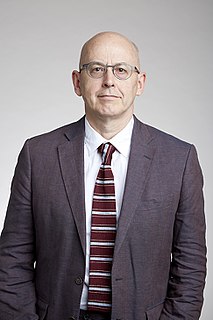Related Research Articles
Sir Richard Brook Sykes, is a British microbiologist, the chair of the Royal Institution, the UK Stem Cell Foundation, and the trustees at King Edward VII's Hospital, and chancellor of Brunel University. As of June 2021, he is chair of the UK's Vaccine Taskforce, where he is responsible for overseeing the delivery of the COVID-19 vaccination programme, including preparations for booster programmes and encouraging vaccine innovation in the UK.

Robert Royston Amos Coombs FRS FRCPath FRCP was a British immunologist, co-discoverer of the Coombs test (1945) used for detecting antibodies in various clinical scenarios, such as Rh disease and blood transfusion.

Sir Salvador Moncada, FRS, FRCP, FMedSci is a Honduran-British pharmacologist and professor. He is currently Research Domain Director for Cancer at the University of Manchester.
Sir Gabriel Horn, MD, ScD, FRS, FRCP was a British neuroscientist and Professor in Natural Sciences (Zoology) at the University of Cambridge. His research was into the neural mechanisms of learning and memory.
Sir Rex Edward Richards was a British scientist and academic. He served as Vice-Chancellor of the University of Oxford and as a director of the Leverhulme Trust.

John Sebastian Bach Stopford, Baron Stopford of Fallowfield KBE FRCS FRCP FRS was a British peer, a physician and anatomist, and a Vice-Chancellor of the University of Manchester. Lord Stopford was described as "one of the greatest anatomists of this century".

Philip Henry Pye-Smith FRS FRCP was an English physician, medical scientist and educator. His interest was physiology, specialising in skin diseases.

Norman Henry Ashton CBE, FRCP, FRCS, FRCPATH, FRCOphth, FRS was a British ophthalmologist and pathologist.
Sir Mark Brian Pepys is a South African-born British academic of medicine. He was until 2011 Professor of Medicine at University College London and Head of Medicine at the Hampstead Campus and the Royal Free Hospital.
Sir Charles Herbert Stuart-Harris was an English virologist and academic who was the first full-time professor of medicine at University of Sheffield.
Martin Bobrow is a British geneticist, and Emeritus Fellow, Wolfson College, Cambridge.
Emmanuel Ciprian Amoroso, CBE, FRCS, FRCOG, FRCP, FRCPath, FRS, was a Trinidadian reproductive physiologist and developmental biologist with an interest in placenta physiology. Initially studying medicine in Ireland in the 1920s, he was subsequently based in Britain for the rest of his life. He was the first person from the West Indies to be elected as a Fellow of the Royal Society, in 1957, and he had the distinction of being a Fellow of four of the Royal Colleges: Surgeons in 1960, Obstetricians and Gynaecologists in 1965, Physicians in 1966, and Pathologists in 1973.
Rodney Harris was a British geneticist.

Paul Emanuel Polani, FRCP, HonFRCP(Ire), FRCPCH, FRCOG, HonFRCPath, DCH, FRS, (1914–2006) was an Italian-Austrian geneticist, described by the Royal College of Physicians as "one of the key figures in the development of medical genetics".
James Scott FRCP, FIBiol, FMedSci, FRS is a British cardiologist.

Richard Somerset Houlston is a Professor of Cancer Genomics at the Institute of Cancer Research in London.
Frederick Stratton was an English haematologist and an internationally recognized expert in blood transfusion. He is known for discovering one of the Rh allelomorphs.
Lawrence Paul Garrod, was a British bacteriologist who studied uses of penicillin. In 1929, he was a reader in the University of London and became professor of bacteriology in 1934, a post that he held until his retirement in 1961. He was a member of committees of the Department of Health, the Medical Research Council and World Health Organization.
Laura Piddock is a microbiologist, specialising in antibiotics and antibiotic resistance in bacteria. She is Professor Emeritus at the University of Birmingham, UK and also Scientific Director within the Global Antibiotic Research and Development Partnership.
The Garrod Lecture and Medal is an award presented by the British Society for Antimicrobial Chemotherapy. It was established in 1982 and named for L. P. Garrod. The medal is made of silver by the Birmingham Mint. The recipient of the award is considered by the society as having international authority in the field of antimicrobial chemotherapy. They are invited to deliver an accompanying lecture and receive honorary membership of the Society.
References
- 1 2 3 "Professor Sir Marcus Henry Richmond (born 1931). M.A. Ph.D., D.Sc. (Cantab.), Hon.LL.D., F.R.C.P. (Lond.), F.R.C.Path., F.R.S. – Vice-Chancellor of Manchester University" (PDF). Epsom College. Archived from the original (PDF) on 14 June 2015. Retrieved 26 June 2017.
- 1 2 3 4 5 6 7 8 9 Lois Reynolds; Tilli Tansey, eds. (2008). Superbugs and Superdrugs: A History of MRSA. Wellcome Witnesses to Contemporary Medicine. History of Modern Biomedicine Research Group. ISBN 978-0-85484-114-1. OL 23194335M. Wikidata Q29581755.
- ↑ "Garrod Lecture & Medal". The British Society for Antimicrobial Chemotherapy. 2021. Archived from the original on 2 November 2021. Retrieved 2 November 2021.
- ↑ "Mark Richmond". Royal Society. Retrieved 26 June 2017.
- ↑ United Kingdom list: "No. 50551". The London Gazette (Supplement). 13 June 1986. p. 2.